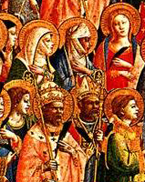
Council of Ephesus (431)
The Council of Ephesus was held in 431 at the Church of Mary in Ephesus. St. Cyril, Patriarch of Alexandria, appealed to Pope Celestine I, Patriarch of Rome charging Nestorius, Patriarch of Constantinople with heresy. Celestine agreed and gave Cyril his authority to serve a notice to Nestorius to recant his views or else be excommunicated. Before the summons arrived, Nestorius convinced the Emperor Theodosius II to hold a General council, a platform to argue their opposing views. Approximately 250 bishops were present. The proceedings were conducted in a heated atmosphere of confrontation and recriminations. It is believed to be the Third Ecumenical Council by the Oriental Orthodox, the Eastern Orthodox, the Roman Catholics, the Old Catholics, and a number of other Western Christian groups. Ephesus, along with all subsequent councils, is rejected by the Assyrian Church of the East (Nestorian). There is good evidence that in fact the Church of the East, being outside the Roman Empire, was not invited to this council and was not represented there; hence its non-adherence to it is quite natural.
Canons and Declarations
Cyril's Council of Ephesus declared it "unlawful for anyone to write, or to compose a different Faith as a rival to that established by the holy Fathers assembled with the Holy Ghost in Nicea", It did not specify whether it meant the Nicene Creed as adopted by the First Council of Nicaea in 325, or as added to and modified by the First Council of Constantinople in 381.
In addition, it condemned Pelagianism.
Eight canons were passed:
1-5. Condemned Nestorius and Caelestius and their followers as heretics.
6. Decreed deposition from clerical office or excommunication for those who did not accept the Council's decrees.
7. Condemned any departure from the creed established by the First Council of Nicaea, in particular an exposition by the priest Charisius.
8. Condemned interference by the Bishop in affairs of the Church in Cyprus and decreed generally, so that no bishop was to "assume control of any province which has not heretofore, from the very beginning, been under his own hand or that of his predecessors ... the Canons of the Fathers be transgressed".
Nestorius had been a well-known pious priest from Antioch who took seriously his duties as Patriarch of Constantinople. There is probably more politics than theology involved in this very divisive council which is not recognized by the Assyrian Church of the East (which while not Nestorian in theology did allow Nestorius to abide in its confines after he escaped from the Empire). It seems it was Mar Nestorius' intent to live out his exile peaceably and content in the thought that he would be vindicated and brought back to the Empire. Sadly with his kidnapping, this never occurred.




